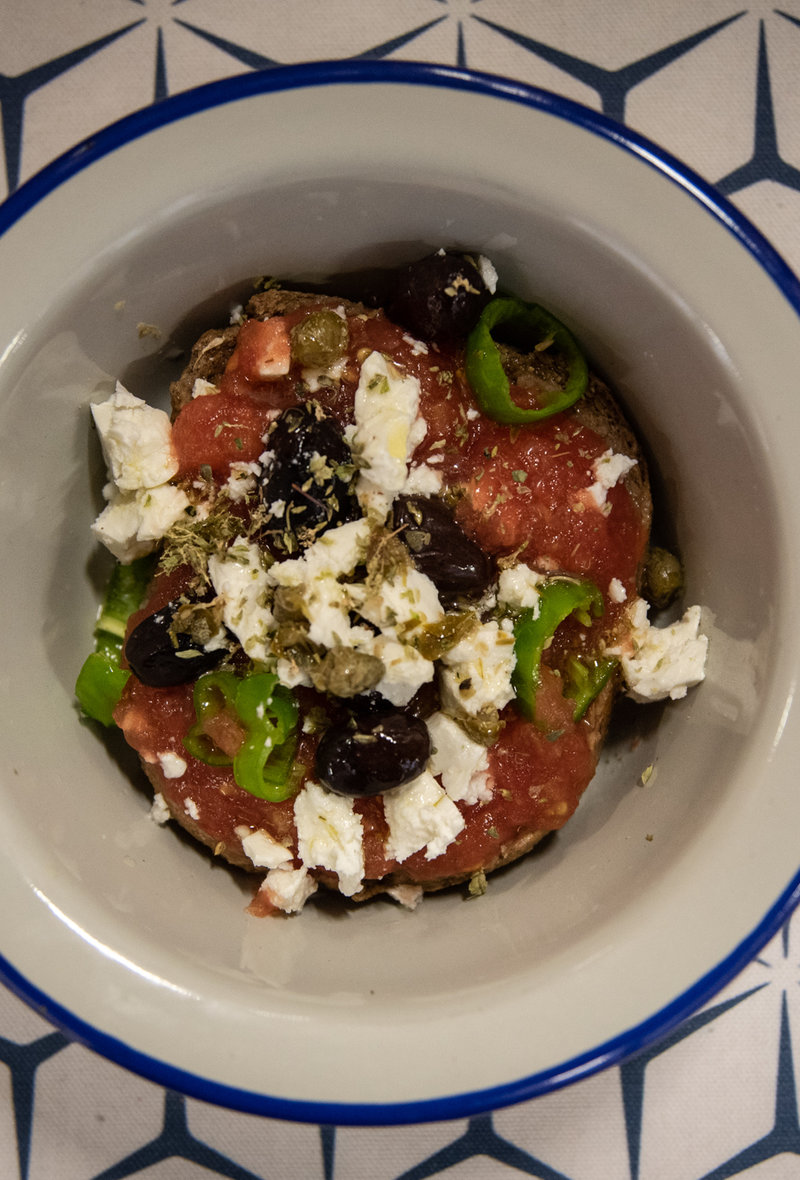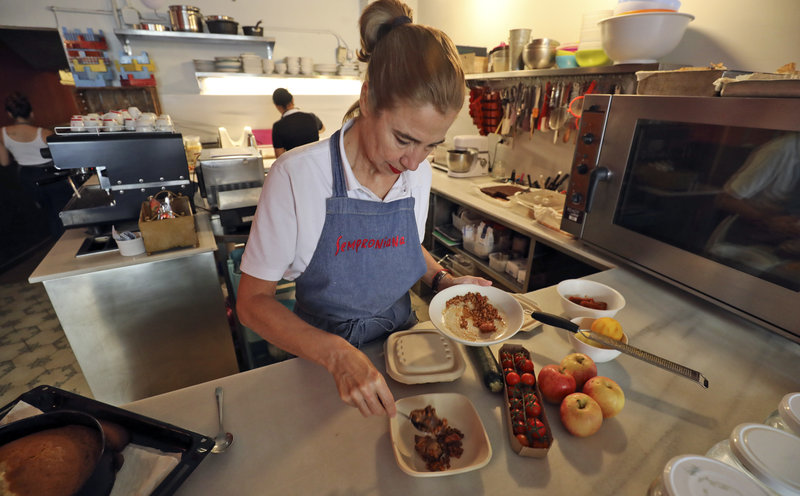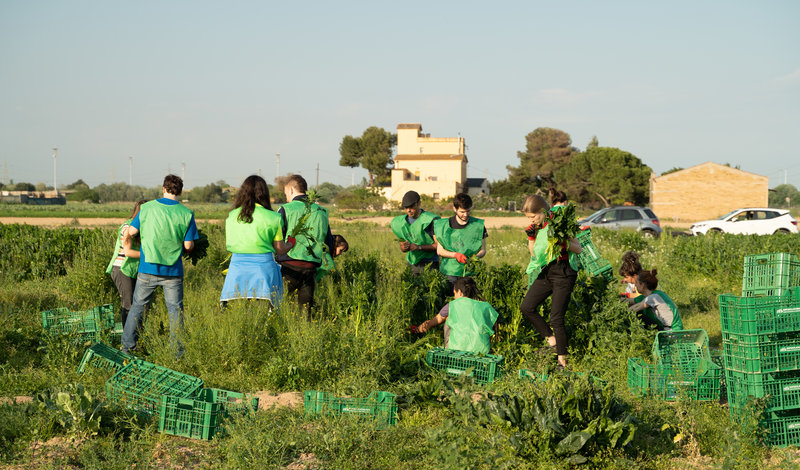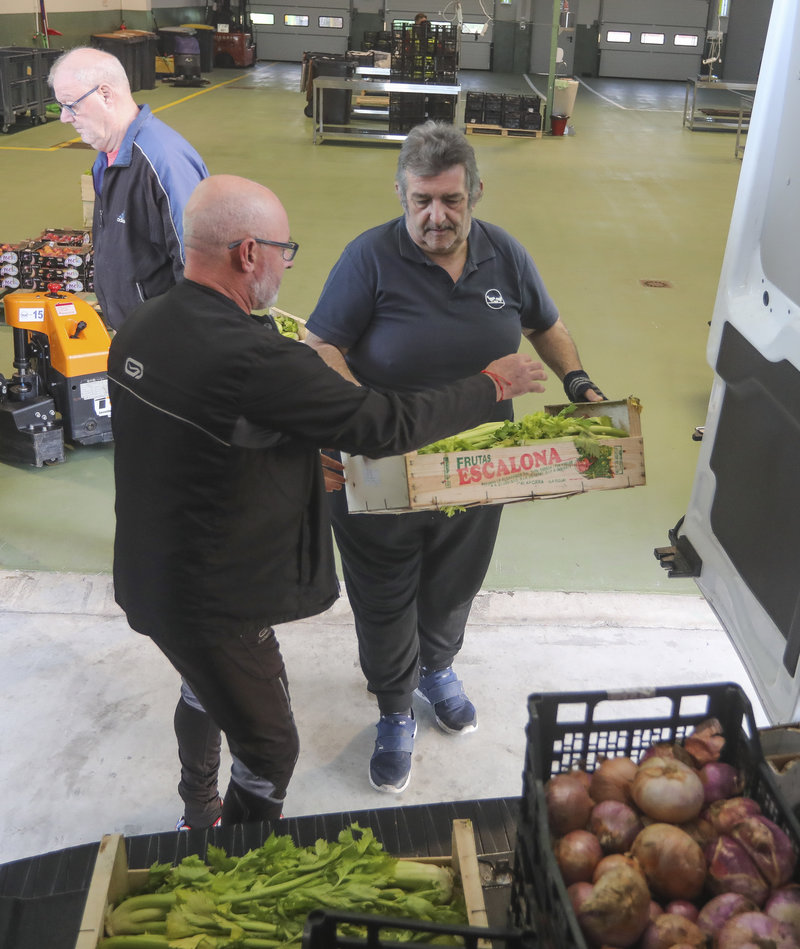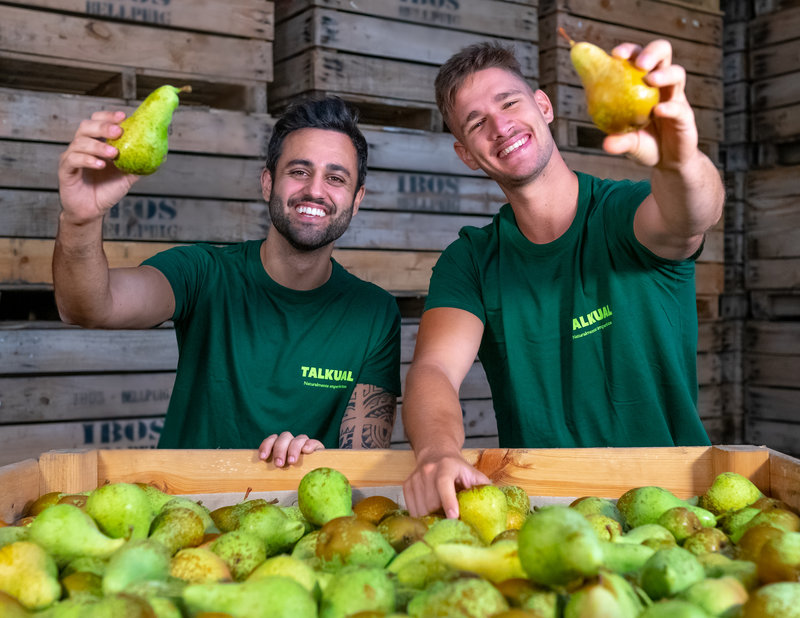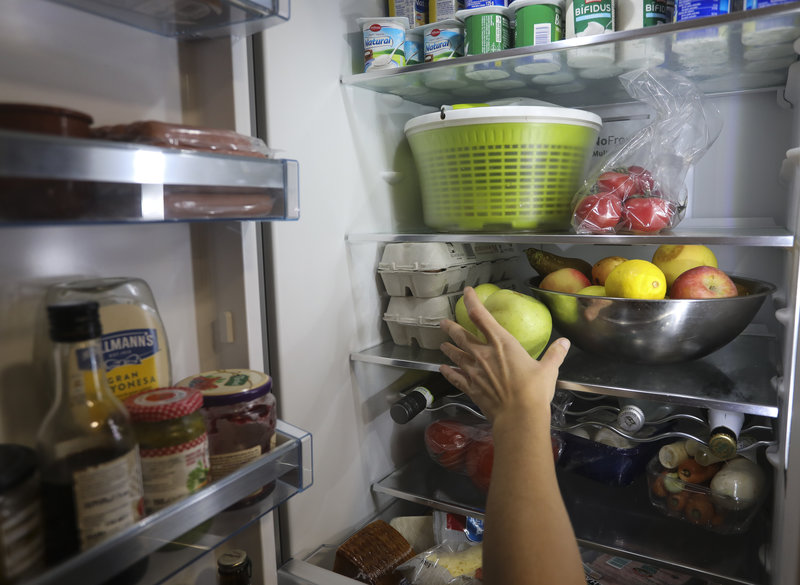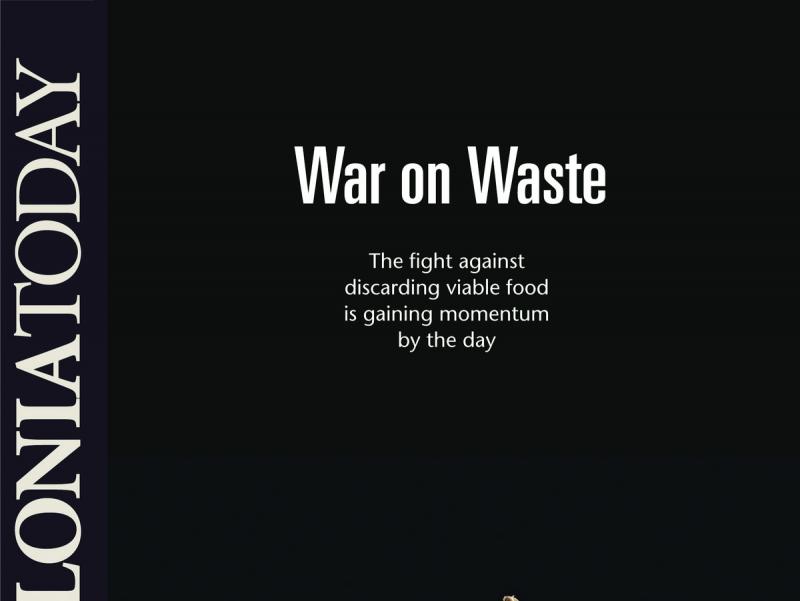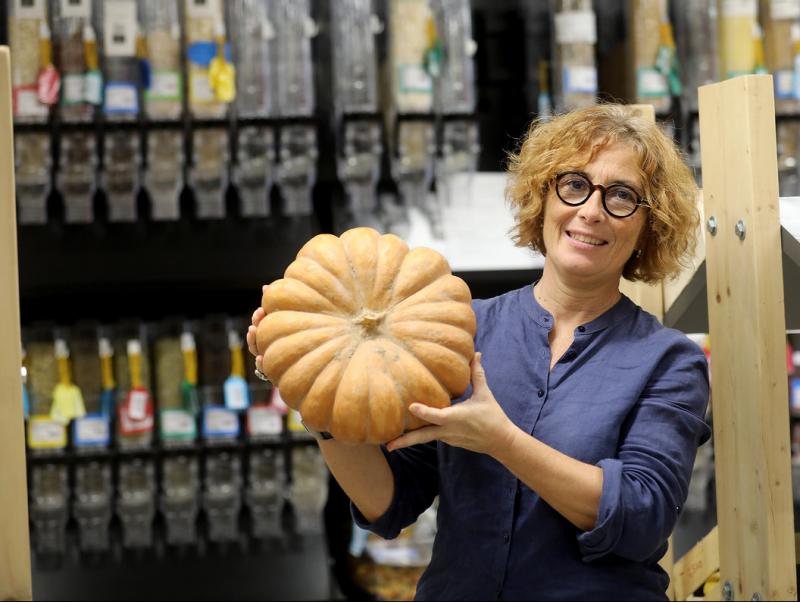On the table and not in the bin
The fight against food waste is progressing in Catalonia with the introduction of a pioneering law (still to be implemented), while hundreds of activists and projects are calling the current food model unsustainable
“If the customer doesn’t ask for bread, I don’t include it because a lot gets thrown away” “Until recently only a few of us talked about food waste, now there are a lot more”
“With just a little bit of skill, you can easily make some great dishes using food that was destined for the landfill”
“The first thing we need is a specific and homogeneous methodology for quantifying food waste”
Cocoa brownie with bananas, salty dehydrated tomato and feta cheese cake, flower tacos, Greek dakos, organic horchata and Jamaican water are just some of the dishes and refreshments on offer in the self-styled anti-waste culinary laboratory cafe that arrived in the Barcelona neighbourhood of Sants in September. It works with fresh, seasonal and local produce, and has reached agreements with local supermarkets to take advantage of those products that they could not sell at the end of the day. As Nikoletta Theodoridi, promoter of the sObres Mestres project, explains, “the large distribution chains package six apples together, for example, and if they go past the sell-by date they can no longer be sold, but the fruit is perfectly fine, as is also the case with kiwis or lettuce, which is taken off the shelves simply because new ones have arrived”. With these products, which still have all their taste and properties, sObres Mestres makes tasty and healthy dishes that fill their customers’ stomachs while also making an impression on their consciences: they are enjoying food that, due to an absurd and flawed system, was about to end up in the rubbish bin. They are working to ensure that initiatives like theirs are not a one-off, and like the rest of the activists in the fight against food waste consulted for this report, note that although things have changed a lot in Catalonia in recent years, much work remains to be done, and in many different areas.
According to the Waste Agency of Catalonia (although the latest data are from back in 2010), each of us wastes around 35 kg of food a year. It is a scandalous figure, but there are even more worrying nuances. As Gaby Susanna, spokesperson for the Plataforma Aprofitem les Aliments points out, municipal waste from retail, catering and households was analysed to obtain these data and, they therefore “do not take into account the whole food cycle”. “This means that the figures are short; in fact, studies have been carried out in Europe that show up to 180 kg wasted per inhabitant.” “We need an up-to-date and complete diagnosis to know where we are starting from, so that we can propose measures and then see after a few years whether they have been sufficient,” Susanna says.
The power of every act
The Espigoladors Foundation is a pioneering local organisation that has recovered - and dignified - an activity with centuries of history: espigolament or what was once referred to as “gleaning” in English. This practice consists in reaching an agreement with the farmer to collect the fruits and vegetables that are discarded from the commercial circuit due to surplus production, decline in sales or aesthetic issues. The foundation channels them to social organisations and also makes jams, compotes, sauces and vegetable pâtés via its Es im-perfect brand, founded in 2015, which provides employment for vulnerable groups. The Espigoladors has already recovered more than 2,200 tonnes of food and has just presented a study that quantifies the losses of fruit and vegetables in the primary sector, while looking for the causes to alleviate “the lack of in-depth analysis of this problem at the Catalan and state level” and offer a protocol that can be easily replicated. Despite pointing out that “the results show the complexity of the problem and that it has multiple causes”, the analysis makes it clear that one of the main reasons for the losses in the primary sector is the fact that the fruits and vegetables do not meet the aesthetic requirements of the customer or the market. Apples that are too small, potatoes that are too big, peaches that are a bit mushy, plums with scars... such foods do not look appealing and the vast majority of consumers do not want them - and therefore neither does the point of sale - no matter how good they might be.
As Raquel Díaz, director of the Espigoladors Foundation and co-author of the study, reflects, “we all think we don’t throw away food, but we must be aware that our acts of consumption have an impact on losses and waste in other parts of the agri-food system, whether local farmers, the neighbourhood store or far-off producers due to the globalised system”. “Only the prettiest cauliflowers, the perfect ones, the ones that match the packaging are sold... We don’t talk enough, then, about how our food decisions are contributing to a lot of loss and waste.”
The foundation has for many years held workshops to raise public awareness, but now it is also focusing its efforts on training trainers “to make a difference”. “If you address groups such as young people, monitors and teachers, you can delve deeper into the complexity of the problem and they can become agents of change,” explains Díaz. The main message she would like to see is that waste must be worked on structurally because it is “one of the key aspects in the unsustainability of the current agri-food system”, and that people’s right to food must be guaranteed through their empowerment. The foundation therefore channels surplus fruit and vegetables from the countryside to social entities, but it also has several transformative projects underway, such as La Botiga del Prat de Llobregat, where users of social services do not receive a sealed package of food, but can choose which ones they take away through a points system. “The food guarantee projects,” the director of the Espigoladors Foundation says, “should not depend on the surpluses of the system, but have resources to be able to make food purchases with sustainability and health criteria and adapting to the needs of each person.”
The restaurateur Ada Parellada is a pioneer in Catalonia not only in terms of cuisine, but in the fight against waste. She is behind the initiative of Gastrorecup dinners, which are made up of dishes that demonstrate how “with a bit of skill you can make great dishes using food that was destined for the landfill”. Six editions have been held at her restaurant, El Semproniana in Barcelona, but for the first time and thanks to the impetus of the Catalan Department of Climate Action, Food and Rural Agenda, the seventh edition was held in other locations this year: La Cava de Tàrrega, Can Xapes de Cornellà del Terri and Albert Guzmán de la Ràpita. “The aim is that next year it will be replicated on the same day in all restaurants in Catalonia that want to get involved,” Parellada says. As she recalls, when this project began “people would often ask if the food was bad for them, and now there is much more information and peace of mind, people have understood that there are many foods in perfect condition that have been discarded for various reasons, normally commercial ones”. She makes it clear that in no case are we talking about food in bad – or even questionable – condition, but that it’s just about “using common sense”. “We’ve taken to reading the best before date as if it were a notarial document, but we have to start trusting our senses again.”
Parellada believes that there was a moment when it went “from ethical to aesthetic cuisine”, and even remembers an internationally renowned chef at a congress saying that we had to learn to throw food away - and so that happened in many restaurants – although she believes the dynamics are now changing (especially in restaurants that are not part of a chain) “due to environmental and social, but also economic awareness, because throwing away food is a clear symptom of poor business management”. She and her team use techniques as simple as checking the fridge every day and following the “first come, first served” rule, only bringing the bread included in the menu if the customer asks for it (they used to throw a lot of it away) and offer three plate sizes a la carte so that everyone can order what they know they’ll finish.
Methodology and staff
The Catalan law against food waste, approved just before lockdown but still to be implemented, establishes that all companies in the food chain must draw up a plan to prevent food losses and waste, a very important change because those that do not act of their own accord will be forced into action. As Amèlia Sarroca reports, a Food Waste Manager at CREDA (the Centre for Research in Food Economy and Development at the Polytechnic University of Catalonia or UPC), the first thing that needs to be instigated on an international scale is a specific and homogeneous methodology for quantifying food waste and for there to be enough qualified personnel to achieve this. Work is being done on both. “We’re trying to get students to get more and more involved in these topics, and even to make them Final Degree and Master’s theses. Students are the ones who will have it in their hands to help companies make a more sustainable world, in addition to showing them that they will also be more profitable this way.” For the methodology, it is very important to publicise existing good practices and help companies forge alliances, which is why CREDA participates in numerous outreach initiatives and participatory workshops. This year, the UPC has focused on sustainable food in the Recircula Challenge, a competition in which several teams of students are posed a challenge and the best solutions receive an award. The finalists include a proposal for Aeye, a small device that can be easily attached to the fridge and, thanks to AI, detects what goes in and what comes out, therefore predicting what is about to expire. In fact, Sarroca points out, new technologies can help a lot in the war on waste, and there is already software that helps restaurants plan purchases better, although not everyone “wants it or knows how to use it” .
Ant or bear ration?
The hunger traffic light is one of CREDA’s proposals to reduce leftovers in school canteens. It involves the canteen monitors explaining to the children the importance of not ordering more than they will eat, so as not to throw anything away. The students can choose between three plate sizes: an ant, fox or bear ration. With the measures that have been applied in a pilot plan, four schools in Barcelona province have managed to reduce waste by an average of 30%. Sarroca recalls that there are many interesting projects underway, even though the pandemic has postponed some of them and now “we must ensure that they restart”.
One ambitious initiative that has not stopped in Catalonia but has continued to take steps is Mercabarna’s work against waste, which has culminated in this year’s inauguration of a pioneering food use centre, called Foodback. This is a market space where a selection of surplus fruit and vegetables is provided by wholesalers to give them a second life. It is innovative not only because the recycling process has been made easier and sorting has been made more professional, but because it is trying to make the most of all the leftovers. Thus, once the non-marketable food suitable for human consumption is received, a selection is made, and those that are in good condition are sent to social entities. Since the aim is not to waste anything, however, a pilot test is being done with the Espigoladors Foundation to see whether the fruits and vegetables that have not passed the first filter can still be used. The aim is, for example, that overripe fruit can be used to make a compote that can go to soup kitchens.
Catalan regulations foresee sanctions for companies that do not have prevention plans, but the association of manufacturers and distributors AECOC is committed to the path of compromise and recalls that its associates have worked voluntarily on the initiative L’alimentació no té desaprofitament since 2012, which has reduced discarded food by more than 50%. David Esteller is in charge of the project and notes that Italian law, for example, rewards companies that donate products to food banks.
Technological innovations also help. Too Good to Go is one mobile application aimed at giving way what shops have not been able to sell. It offers surprise food packages (depending on the surplus of the day) with discounts of up to 70%. Some 3.2 million of such packs have already been saved in Catalonia.
feature food waste
feature FOOD WASTE
feature fOOD WASTE
Perfect on the inside
The Bellpuig-based company Talkual has managed to save more than 775,000 kg of fruit and vegetables in just two and a half years. The company has been in operation for a long time now, selling horticultural products discarded by supermarkets for aesthetic reasons - either because they are not the standard size or the skin has blemishes or imperfections. “Fruits and vegetables which are different on the outside but perfect on the inside,” they announce on their website. Behind this project are Marc Ibós and Oriol Aldomà, and what they want is to make consumers understand that when they go to buy fruit and vegetables, they should see them all equally, and not everything that comes out of the field is the same size or aesthetically perfect.
Talkual customers can choose between buying a fruit or vegetable box or a combination. The fruit comes from small local producers and arrives at customers’ homes directly from the field at the frequency chosen. According to the promoters of the project, it is up to 20% cheaper than going to a conventional store. It is always seasonal produce that has been discarded: melons that are too small, pears with spots on the skin, pomegranates that are not quite round or plums that have suffered a hailstorm and therefore have small scars. It is always in perfect condition and retains its taste and all of its properties, but the large distributors do not want it because it is not visually appealing.
“The farmers find it hard to believe we will buy a product they throw away,” explain the two entrepreneurs, who say things are gradually changing. They emphasise the fact that citizens are increasingly aware how necessary it is to make a commitment to a “responsible and sustainable” consumption model. This is based on the figures that the company has achieved: they currently distribute to more than 2,100 subscribers from all over Spain, and send around 1,500 boxes of imperfect fruit and vegetables each week.
Most of their customers are from big cities like Barcelona and Madrid. The company has gone from an annual turnover of 800,000 to 1.5 million euros, and now has 16 workers, three of whom are people at risk of social exclusion. As for the producers they collaborate with, there already number 90, and the promoters of Talkual are satisfied with the help they bring to the agricultural sector in the area. “It’s a win-win” for both parties, they say.
A pioneering law
The Catalan law against food waste is a pioneering one in Europe because, unlike the French or Italian laws, it prioritises the prevention of food losses and waste over the redistribution of surpluses, and it does so throughout the entire food chain, from primary production to the end consumer. It is popularly known as the “tupper” law, because it obliges restaurants to give biodegradable containers to customers to take their leftover food with them and to advertise this clearly and visibly in the establishment itself, preferably on the menu.
The Catalan regulation, approved in March 2020, a few days before the world stopped, also prohibits commercial establishments or supermarkets of over 400 m² from immediately throwing away products that have passed their best-before date, urging companies to encourage the sale of immediate consumption products with measures such as price reduction and displays in a separate area. Since then, it has been common to see such food in shops and supermarkets with discounts of around 25%, as is the case with Ametller Origen. In September, in addition, this chain specialising in the sale of fresh products promoted the campaign Si malbarates, no estalvies: el valor real dels aliments (If you waste, you don’t save: the real value of food) to make its customers more aware of the issue, and instead of advertising claims, in its stores we hear messages like “if you throw away a tomato, you’re wasting 18 litres of water” or “throwing a potato away is equivalent to charging your mobile phone more than five times”.
In the event that food is not consumed and expires, the law establishes that these surpluses be put to other uses, primarily animal feed but, if this is not possible, for industrial purposes, including making compost or ways of energy generation such as biogas. Finally, the law also stipulates that companies must have a food loss and waste prevention plan. The problem is that the pandemic has slowed down the implementation of laws and that the new Spanish law on the prevention of food loss and waste is also pending. Several entities have already complained, however, because they believe the latter to be unambitious and that, although included in the title, it does not place enough emphasis on quantifying and preventing losses. The Espigoladors Foundation, for example, is “surprised” by the “little presence” in the state-wide legislative proposal of mechanisms for preventing and quantifying food losses in the primary sector. The entity also points out that companies need to be “offered financial support”, especially SMEs.
Tips, tricks and recipes
Many people know that the best way to store bread is to use a laundry bag to prevent moisture loss, or that it is a good idea to store bananas in the refrigerator drawer wrapped in newspaper, but maybe we are not so clear that apples will last longer if we leave them next to potatoes, or that lettuce deteriorates more slowly if we cut it with a plastic or ceramic knife. If we have leftover spinach, it is best to freeze it after cleaning, blanching and drying it very well. On the other hand, tomatoes can be put straight in the refrigerator, although better peeled. These are some of the tricks offered by the Som Gent de Profit portal, which also includes a portion calculator (an individual should eat around 80 grammes of rice and 120 of fresh pasta) and a recipe book with hundreds of dishes to take advantage of leftovers from the fridge. We can access the virtual cookbook by typing in the name of the food we have left over, or that is about to go off, and if we do this with tomatoes, for example, we will see that there are up to 14 tips and 40 recipes to extend their life, including making a preserve or a stir-fry.
In fact, making use of leftovers permeates all of our gastronomy, from the classic bread with tomato - to make bread from the previous day softer - to fishermen’s soup - which in its beginnings was made with the fish and seafood that had not been sold - including Boxing Day cannelloni - designed to take advantage of the abundant leftovers from Christmas Day. In the time of our grandparents, food shortages and economic difficulties forced them not to throw away even a simple slice of bread, no matter how dry it was (with it they would make soups, croutons, puddings, etc.), but now this practice is making a comeback not only because inflation is stifling, but thanks to social and ecological awareness. Whether for the planet or the pocket, we are rediscovering the enormous possibilities of each ingredient, and social networks amplify the echo of tricks, recipes and tips.
On the Barcelona City Council website, there is a specific section dedicated to extending the life of foodstuffs, which extols the virtues of “not only making use of food that is about to go off, but also adding to recipes other ingredients that we don’t usually eat, such as the leaves or the pieces of many vegetables which, added to broths or salads, give a very special taste”. Although we associate them with sweets, adds the portal, a great field to explore are cakes made from savoury products, such as leftover rice, potatoes, fish, vegetables or meat.

